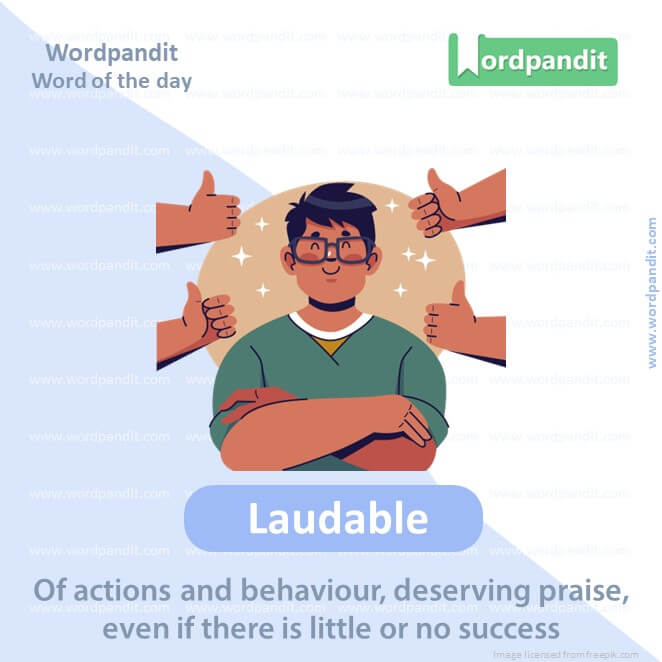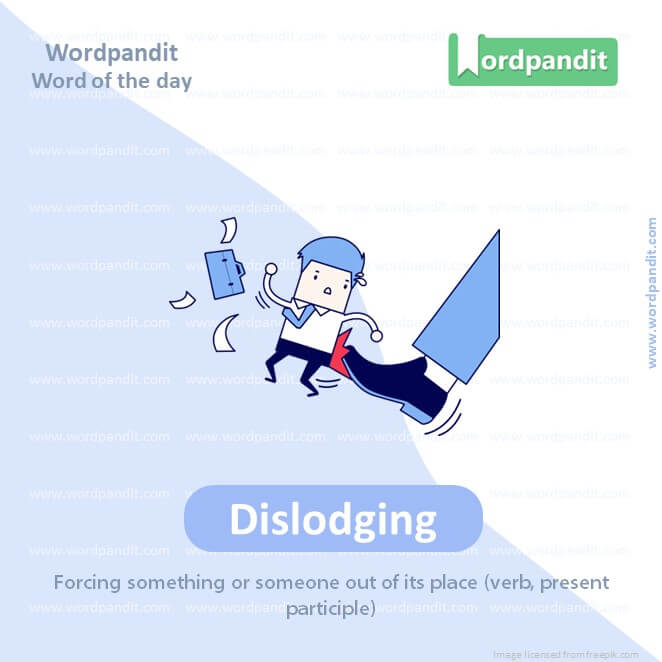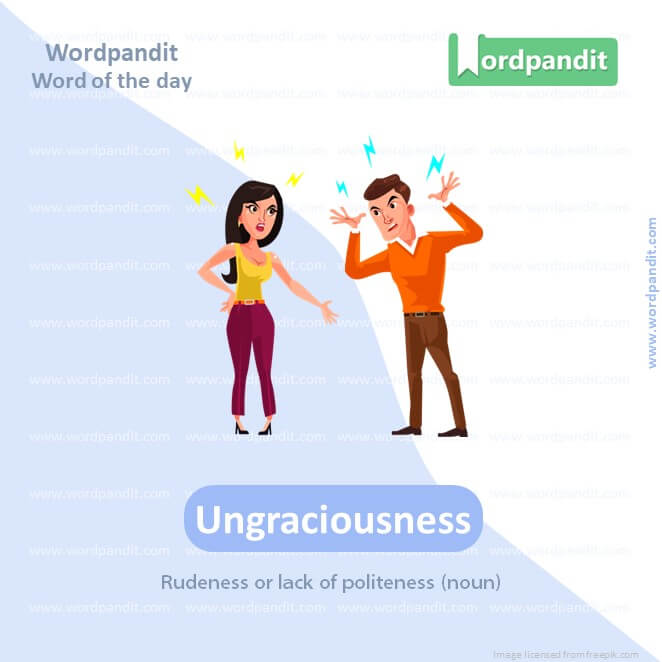Daily Vocabulary Words: List of Daily Used Words in Leading International Newspapers
Hi there. Welcome to this special section @ Wordpandit.
Our endeavour here is very simple: to highlight important daily vocabulary words, which you would come across in leading newspapers in the country. We have included the following newspapers in our selection:
• The New York Times
• The Washington Post
• Scientific American
• BBC
• The Guardian
• Psychology Today
• Wall Street Journal
• The Economist
We are putting in extensive work for developing your vocabulary. All you have got to do is be regular with this section and check out this post on a daily basis. This is your repository of words that are commonly used and essentially, we are posting a list of daily used words. Hence, this has significant practical application as it teaches you words that are used commonly in leading publications mentioned above.
Visit the website daily to learn words from leading international newspapers.

WORD-1: Laudable
CONTEXT: In announcing that the United States will pause delivery of 3,500 bombs to Israel, President Biden has the laudable motive of wanting to spare innocent Palestinians from the military consequences of Hamas using Rafah as its last stronghold in Gaza.
SOURCE: The New York Times
EXPLANATORY PARAGRAPH: Imagine your friend helps an elderly neighbor carry groceries, and everyone says, “That’s so kind of you!” That’s “laudable.” It means doing something really good that deserves praise.
MEANING: Of actions and behaviour, deserving praise, even if there is little or no success.
PRONUNCIATION: LAW-duh-bul
SYNONYMS: praiseworthy, commendable, admirable, meritorious, worthy
USAGE EXAMPLES:
1. Her commitment to charity work is truly laudable.
2. The student’s laudable efforts earned him a special award.
3. The firefighters’ bravery during the rescue was laudable.
4. His dedication to protecting the environment is laudable.

WORD-2: Emboldens
CONTEXT: And it emboldens Hamas to continue playing for time — especially in the hostage negotiations — with the idea that the longer it holds out, the likelier it is to survive.
SOURCE: The New York Times
EXPLANATORY PARAGRAPH: If your friend tells you, “You can do it!” and you feel brave enough to try, that’s “embolden.” It means helping someone feel strong and confident.
MEANING: Makes someone more confident or brave (verb, present tense).
PRONUNCIATION: em-BOHL-dnz
SYNONYMS: encourages, inspires, motivates, strengthens, boosts
USAGE EXAMPLES:
1. His supportive words embolden her to speak up.
2. Winning the first game emboldens the team to aim for the championship.
3. The success of her first novel emboldens her to write more.
4. The teacher’s positive feedback emboldens the students to keep learning.

WORD-3: Dislodging
CONTEXT: If the Biden administration has ideas about how to do that without dislodging it from Rafah, we have yet to hear of them.
SOURCE: The New York Times
EXPLANATORY PARAGRAPH: Imagine there’s a rock stuck in a hole, and you keep pulling it until it finally comes out. That’s “dislodging.” It means moving something that’s stuck or not easily movable.
MEANING: Forcing something or someone out of its place (verb, present participle).
PRONUNCIATION: dis-LOJ-ing
SYNONYMS: removing, extracting, shifting, unseating, ejecting
USAGE EXAMPLES:
1. The rescue team focused on dislodging the debris blocking the cave entrance.
2. He succeeded in dislodging the stubborn cork from the bottle.
3. The earthquake was powerful enough for dislodging rocks from the mountain.
4. The squirrel kept dislodging the bird feeder from its stand.
WORD-4: Deterrent
CONTEXT: It diminishes Israel’s deterrent power and is a recipe for a wider war.
SOURCE: The New York Times
EXPLANATORY PARAGRAPH: If your parents tell you that staying up too late will make you tired in the morning, and it makes you decide to go to bed early, that’s a “deterrent.” It means something that stops you from doing something.
MEANING: Something that discourages or prevents someone from doing something (noun).
PRONUNCIATION: dih-TUR-uhnt
SYNONYMS: obstacle, hindrance, discouragement, restraint, preventative
USAGE EXAMPLES:
1. The high fines act as a deterrent against littering.
2. The security camera serves as a deterrent to potential thieves.
3. The threat of punishment is used as a deterrent in the classroom.
4. The cold weather was a strong deterrent to going outside.
WORD-5: Stalwart
CONTEXT: But an arms cutoff that weakens Israel as it faces enemies on multiple fronts is unworthy of a president whose clear and stalwart support for the Jewish state at its lowest moment was — and should remain — his finest hour.
SOURCE: The New York Times
EXPLANATORY PARAGRAPH: Imagine a big, strong tree that stands tall even in strong winds. That’s “stalwart.” It means someone or something that’s strong and dependable.
MEANING: Strong, reliable, and loyal (adjective). A loyal and reliable person (noun).
PRONUNCIATION: STAWL-wurt
SYNONYMS: steadfast, dependable, loyal, faithful, resolute
USAGE EXAMPLES:
1. He has always been a stalwart friend, ready to help at any time.
2. The stalwart defenders held their ground despite the attack.
3. She is a stalwart supporter of the animal rights movement.
4. The manager relies on his stalwart team members during busy times.

WORD-6: Ungraciousness
CONTEXT: American society, at every economic level, is still plagued by enmity, distrust, isolation, willful misunderstanding, ungraciousness and just plain meanness.
SOURCE: The New York Times
EXPLANATORY PARAGRAPH: If someone gives you a gift and you don’t say thank you, that’s “ungraciousness.” It means not being polite or kind, especially when someone does something nice.
MEANING: Rudeness or lack of politeness (noun).
PRONUNCIATION: un-GRAY-shuhs-ness
SYNONYMS: rudeness, discourtesy, impoliteness, unkindness, inconsiderateness
USAGE EXAMPLES:
1. His ungraciousness surprised everyone after he refused to thank the host.
2. The ungraciousness of the guest was evident when she criticized the food.
3. Ungraciousness can ruin relationships even with close friends.
4. The team’s ungraciousness after losing upset their fans.
WORD-7: Counterintuitive
CONTEXT: Thurman’s emphasis on methodological rigor and technique influenced King’s brilliant and often counterintuitive principles of nonviolent resistance
SOURCE: The New York Times
EXPLANATORY PARAGRAPH: Imagine that drinking hot chocolate on a hot day actually cools you down. That sounds strange, right? It’s “counterintuitive,” which means it doesn’t make sense at first but might actually be true.
MEANING: Contrary to what one would expect or think (adjective).
PRONUNCIATION: kown-ter-in-TOO-ih-tiv
SYNONYMS: illogical, surprising, unexpected, paradoxical, unusual
USAGE EXAMPLES:
1. It may seem counterintuitive, but drinking warm water can cool you down.
2. The idea of resting to gain more energy is counterintuitive to some.
3. Some diets are counterintuitive because they involve eating more to lose weight.
4. Her suggestion to slow down in order to finish quickly seemed counterintuitive.

WORD-8: Overwhelmingly
CONTEXT: Part of it is surely the influence of the fossil fuel industries, whose dollar donations overwhelmingly go to the G.O.P.
SOURCE: The New York Times
EXPLANATORY PARAGRAPH: If you ask your friends what they want to eat, and almost everyone says pizza, that’s “overwhelmingly.” It means a huge number of people or things agreeing on the same thing.
MEANING: In an extremely strong or great manner (adverb).
PRONUNCIATION: oh-ver-WHEL-ming-lee
SYNONYMS: largely, predominantly, mostly, mainly, greatly
USAGE EXAMPLES:
1. The new law was overwhelmingly approved by the voters.
2. The team was overwhelmingly outnumbered by the opposing side.
3. The response to the charity event was overwhelmingly positive.
4. The class overwhelmingly chose the museum for their field trip.
WORD-9: Muttered
CONTEXT: From the defense table Mr. Trump shook his head in disgust and muttered “bullshit” loud enough that he drew a rebuke from the judge, who called his actions “contemptuous.”
SOURCE: The New York Times
EXPLANATORY PARAGRAPH: If you talk really quietly to yourself because you’re annoyed, that’s “muttered.” It means speaking in a low voice that others can barely hear.
MEANING: Spoke in a low voice that is hard to hear (verb, past tense).
PRONUNCIATION: MUH-terd
SYNONYMS: murmured, whispered, grumbled, mumbled, murmured
USAGE EXAMPLES:
1. She muttered under her breath when her mom asked her to clean her room.
2. He muttered something about being too tired and went back to bed.
3. The old man muttered to himself as he walked down the street.
4. The students muttered in disapproval when the teacher announced a pop quiz.
WORD-10: Jury
CONTEXT: And whether his emotion in that moment was authentic or strategic, the message to the jury seemed pretty clear: How dare she talk about my family?
SOURCE: The New York Times
EXPLANATORY PARAGRAPH: Imagine a group of people sitting together, listening to a story, and then deciding if the person in the story did something right or wrong. That’s a “jury.” It’s a group that listens to all sides and makes a fair decision.
MEANING: A group of people chosen to make a decision in a court case (noun).
PRONUNCIATION: JOO-ree
SYNONYMS: panel, tribunal, committee, board, adjudicators
USAGE EXAMPLES:
1. The jury found the defendant not guilty of all charges.
2. A new jury was selected to hear the high-profile trial.
3. The jury listened carefully to all the evidence before making a decision.
4. The jury’s decision was unanimous in favor of the plaintiff.
Vocabulary Hard Words
The experience of unraveling the depths of language learning often leads us to ‘vocabulary hard words’. These challenging jargons might seem daunting initially, but with the right learning strategies, the enigma of ‘vocabulary hard words’ can turn into an enticing quest. But how can these ‘vocabulary hard words’ be learned effectively?
Firstly, to master ‘vocabulary hard words’, it’s vital to break down the process into manageable steps. Instead of tackling several words at once, focus on understanding a few each day. This gradual approach ensures effective retention and understanding.
Multimedia resources tremendously aid in comprehending ‘vocabulary hard words’. Movies, podcasts, or even music in the target language contribute a comprehensive perspective. They provide real-life contexts and usages of ‘vocabulary hard words’, making them more understandable and less intimidating.
The incorporation of memory-enhancing techniques, such as flashcards or digital apps, can significantly bolster the retention of ‘vocabulary hard words’. Such tools encourage active recall, helping to cement these words into your long-term memory. Mnemonic devices can also aid in making these words more approachable by associating the hard words with relatable images or stories.
Practice is decisive when learning ‘vocabulary hard words’. Using these words in your conversations, written communications, or even social media posts will facilitate a robust understanding and recall.
Finally, do not worry about making mistakes while using ‘vocabulary hard words’. Mistakes are essential stepping stones in the learning process. They provide insights into areas that need more focus and help refine your grasp over these words.
In conclusion, grasping ‘vocabulary hard words’ is undoubtedly a challenging task but not an insurmountable one. With the aid of effective strategies including graded learning, multimedia resources, memory-enhancing tools, and regular practice, the process of mastering ‘vocabulary hard words’ can become an engaging and rewarding journey.










